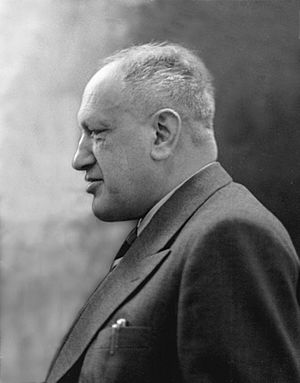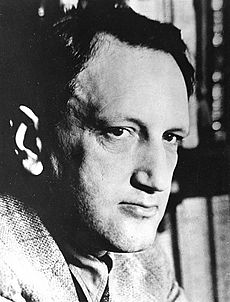Leopold Infeld facts for kids
Leopold Infeld was a famous Polish physicist. He was born on August 20, 1898, and passed away on January 15, 1968. He spent much of his career working in Poland and Canada. Infeld was known for his important work in physics, especially with the theory of relativity. He even worked closely with the legendary scientist Albert Einstein!
Quick facts for kids
Leopold Infeld
|
|
|---|---|

Leopold Infeld in 1960
|
|
| Born | 20 August 1898 |
| Died | January 15, 1968 (aged 69) |
| Citizenship | Austrian (1898–1918) Polish (1918–1968) Canadian (1939–50) |
| Alma mater | Jagiellonian University |
| Known for | Infeld–Van der Waerden symbols Born–Infeld theory Einstein–Infeld–Hoffmann equations Infeld–Hull factorization method |
| Scientific career | |
| Fields | Physics |
| Institutions | Cambridge University Jagiellonian University University of Lwów Princeton University University of Toronto |
| Doctoral students | Alfred Schild Andrzej Trautman P. R. Wallace |
Contents
Early Life and Education
Leopold Infeld was born in Kraków, a city that was then part of the Austro-Hungarian Empire. His family was Polish Jewish. He began his studies in physics at Kraków's Jagiellonian University.
In 1920, he went to Berlin to continue his studies. He even got help from Albert Einstein to get into the University of Berlin. He earned his doctorate degree in 1921. Later, in 1933, he moved to England, and then to the United States and Canada.
Important Scientific Work
Leopold Infeld was very interested in the theory of relativity. This theory helps us understand how space and time are connected. After getting his doctorate, he worked at the University of Lwów from 1930 to 1933.
From 1939 to 1950, he was a professor at the University of Toronto in Canada. A very important part of his career was working with Albert Einstein at Princeton University from 1936 to 1938. Together, they developed equations that describe how stars move. They also wrote a famous book called The Evolution of Physics.
Advocacy for Peace
After the first nuclear weapons were used in 1945, Infeld, like Einstein, became a strong supporter of peace. He believed in using science for good, not for war. Because of his peace activities, some people unfairly thought he supported communism.
In 1950, he decided to leave Canada and return to Poland. He felt it was his duty to help Polish science recover after the terrible Second World War. He became the president of the Polish Physical Society from 1955 to 1957.
At that time, there was a lot of fear about communism. Some in the Canadian government worried he might share secrets, even though his work was in relativity, not nuclear weapons. He lost his Canadian citizenship and was called a traitor. However, his field of study was not directly related to nuclear weapons research.
When Infeld returned to Poland, he asked for time off from the University of Toronto. His request was denied, so he resigned from his job there. Years later, in 1995, the University of Toronto honored him by giving him the title of professor emeritus after his death. In Poland, he became a professor at the University of Warsaw, where he worked until he passed away.
Key Contributions to Physics
Leopold Infeld made several important contributions to physics:
- The Born–Infeld model was named after him and Max Born. It describes how electromagnetic fields behave.
- The Infeld–Hull Factorization Method helps find solutions to important equations in quantum mechanics, like the Schrödinger equation.
- He also helped develop the Einstein–Infeld–Hoffmann equations with Albert Einstein and Banesh Hoffmann. These equations describe the motion of objects in a gravitational field.
Other Activities
In 1955, Infeld was one of 11 scientists who signed the Russell–Einstein Manifesto. This important document called for nuclear disarmament and peace. He is the only person who signed it who did not receive a Nobel Prize.
In 1964, he signed the "Letter of 34." This letter was sent to the Prime Minister of Poland, Józef Cyrankiewicz, asking for more freedom in culture.
Leopold Infeld also wrote books. These include his autobiography, Quest, and a biography about the mathematician Évariste Galois, called Whom the Gods Love.
In 1939, he married Helen Schlauch, who was an American mathematician.
See also
 In Spanish: Leopold Infeld para niños
In Spanish: Leopold Infeld para niños
 | Precious Adams |
 | Lauren Anderson |
 | Janet Collins |


